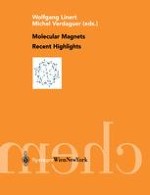2003 | OriginalPaper | Chapter
Localized Orbitals vs. Pseudopotential-Plane Waves Basis Sets: Performances and Accuracy for Molecular Magnetic Systems
Authors : Carlo Massobrio, Eliseo Ruiz
Published in: Molecular Magnets Recent Highlights
Publisher: Springer Vienna
Included in: Professional Book Archive
Activate our intelligent search to find suitable subject content or patents.
Select sections of text to find matching patents with Artificial Intelligence. powered by
Select sections of text to find additional relevant content using AI-assisted search. powered by
Density functional theory, in combination with a) a careful choice of the exchange-correlation part of the total energy and b) localized basis sets for the electronic orbitals, has become the method of choice for calculating the exchange-couplings in magnetic molecular complexes. Orbital expansion on plane waves can be seen as an alternative basis set especially suited to allow optimization of newly synthesized materials of unknown geometries. However, little is known on the predictive power of this scheme to yield quantitative values for exchange coupling constants J as small as a few hundredths of eV (50–300 cm-1). We have used density functional theory and a plane waves basis set to calculate the exchange couplings J of three homodinuclear Cu-based molecular complexes with experimental values ranging from + 40 cm -1 to + 300 cm -1. The plane waves basis set proves as accurate as the localized basis set, thereby suggesting that this approach can be reliably employed to predict and rationalize the magnetic properties of molecular-based materials.
